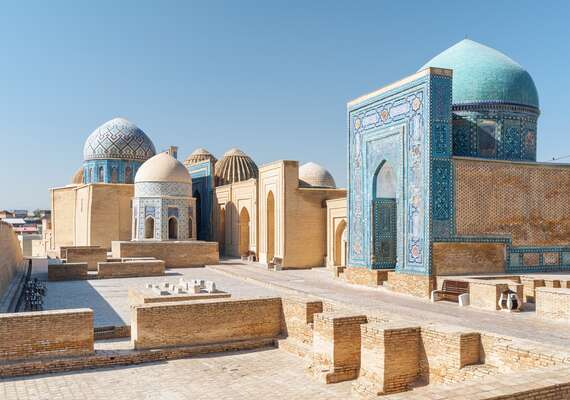Samarkand City Guide

| Country: | Uzbekistan |
| Known Names: | |
| Language: | Uzbek |
| Population: | Approx. 509,000 |
| Religion: | Islam |
| Area Code: | +998 66 |
| Currency: | Uzbekistan Som (UZS) |
| Time Zone: | Uzbekistan Time (UZT) - UTC/GMT +5 hours |
| Visa: | |
| Consulate: |
General Information / Guide
Samarkand, one of the oldest continuously inhabited cities in Central Asia, is known for its rich history and as a crossroad of world cultures. Famous for its Islamic architecture, it was a central city on the Silk Road. Today, it remains a testament to cultural blending and historical layers.
Climate / Weather / When to Go
Samarkand experiences a continental climate, with hot summers and cold winters. The best times to visit are during spring (April to June) and autumn (September to November), when the weather is mild and conducive to exploring.
How to Get There
Samarkand International Airport offers flights primarily from major cities in Russia and other parts of Central Asia. The city is also well-connected by rail, including high-speed trains from major Uzbek cities like Tashkent.
Food / Restaurants / What to Eat and Drink
Samarkand’s cuisine reflects its storied past on the Silk Road, with a mix of Uzbek dishes like plov (rice pilaf), samsa (meat pastries), and skewered meats. Do not miss trying the local bread, non, which holds a UNESCO status.
Important Places / Places to Visit
- Registan Square: Iconic public square surrounded by magnificent madrasahs.
- Gur-e-Amir: Mausoleum of the conqueror Timur (Tamerlane), with stunning architectural features.
- Bibi-Khanym Mosque: A massive mosque built by Timur, once one of the Islamic world’s largest.
- Shah-i-Zinda: A necropolis filled with decorated mausoleums and burial grounds.
- Afrosiab Museum: Situated on the site of ancient Samarkand, with artifacts dating back to the 7th century BC.
What to Do
Samarkand is a treasure trove for cultural and historical exploration. Visit the Registan Square, a stunning example of Islamic architecture, or explore the ancient ruins of Afrasiab. For a relaxing day, head to the verdant Siab Bazaar where you can enjoy local fruits and nuts. Don't miss the Ulugh Beg Observatory to delve into the history of medieval astronomy.
Nightlife / Bars / Entertainment
Nightlife in Samarkand is more subdued but charming, reflecting its rich cultural tapestry. For a local experience, visit the Bahodir Tea House to enjoy traditional music and dance performances. For a modern twist, the Registan Plaza Hotel offers a chic bar with a variety of international drinks.
Shopping / What to Buy
In Samarkand, traditional handicrafts are a must-buy. Look for intricately designed ceramics and hand-woven silk carpets, both of which reflect centuries-old craftsmanship. The central market is a great place to find spices and Uzbek textiles, which are vibrant and colorful, making for wonderful souvenirs or gifts.
Festivals/ Events
January: New Year's Day
March: Navruz (Persian New Year)
April: Tulip Festival
May: Silk and Spices Festival
June: Cultural Heritage Day
August: Independence Day
September: Sharq Taronalari (Music Festival)
October: Grape Harvest Festival
November: Constitution Day
December: New Year Celebrations
Holidays / Festivals / Important Days
1 January: New Year's Day
8 March: International Women's Day
21 March: Navruz (Persian New Year)
1 May: Labor Day
9 May: Day of Memory and Honor
1 September: Independence Day
1 October: Teacher's Day
8 December: Constitution Day
Eid Al-Fitr and Eid Al-Adha (dates vary)
Other Islamic holidays and several national observances mark the calendar.
Things to Pay Attention to / Important Information
Prior to visiting Samarkand, educate yourself about its rich cultural heritage and traditions. In religious sites like mosques and mausoleums, appropriate attire and decorum are important. The local Uzbek language includes a distinct dialect in Samarkand; showing respect for it is appreciated. Bargaining is expected in bazaars such as Siab Bazaar, and keeping an eye on your belongings is wise. Learning some Uzbek phrases can be beneficial. Prepare for hot summers and carry water with you, as Samarkand can be dry and sunny.
Transportation
In Samarkand, common transportation methods are buses, taxis, and personal cars. The city offers several bus routes that are economically priced and connect major attractions and districts. Taxis are another convenient option, though negotiating the fare beforehand is recommended. Driving is common among locals, with moderate traffic compared to larger cities.
